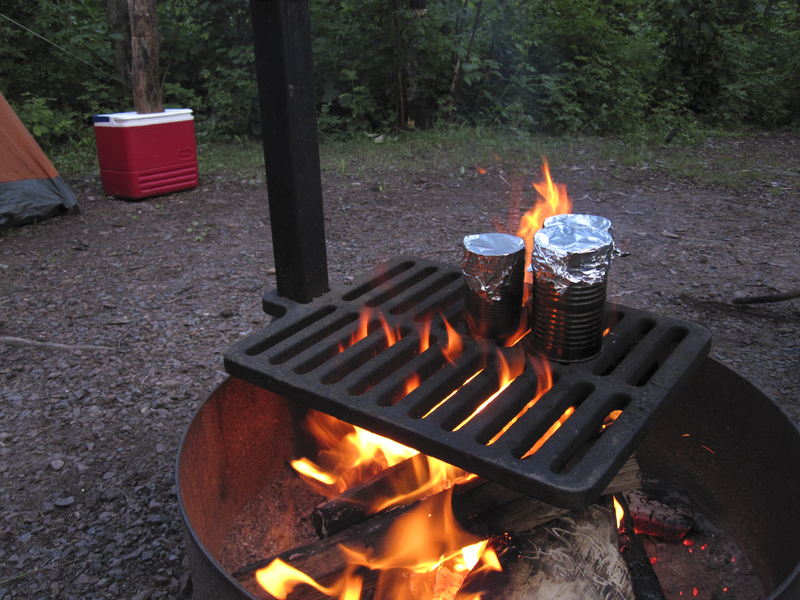Here are some of our favorite non-perishable foods for bringing along on camping trips or other outdoor adventures. We've also included some handy tips for deciding which foods to take with you on your next outing.
MAKING YOUR OWN TRAIL MIX
Instead of going for the already-made boxes and bags of trail mix, you may have a better time making your own. Visit your grocery store’s health food bulk section, and you’re presented with endless possibilities of the kind of trail mix you can make. There are a wide variety of nuts, such as peanuts, Brazil nuts, cashews, and walnuts, as well as seeds that add an interesting flavor as well as provide healthy oils and fats that your body can burn during your hiking trips.Seasoned pumpkin seeds and sunflower seeds can definitely make the difference. You can also add some dried fruit, such as raisins and dried cranberries to add a little sweetness to your trail mix. Banana chips, figs, apples, and shredded coconut are packed with rich vitamins and minerals that will keep you healthy and regular during your trip.
NUT BUTTERS
Peanut butter can be a great way to have multiple meals without having to worry about a lot of clean up. They can provide a quick energy boost, last a long time, and don’t require many special procedures to keep it preserved.This along with almond and cashew butter can also be used to add great flavor and substance to soups and chilies, especially those that are made from leftover meals throughout the week. If you’re worried about carrying an entire jar with you, look for individually packed servings of peanut butter, which can make great snacks during your excursions from your camp site.
FREEZE-DRIED FOODS
These foods are not only lightweight, but have a longer lifespan than their normal counterparts. Many of them can be eaten as they are, but some you can add to a pot of boiling water to have a delicious and hot meal that will keep you satisfied throughout the day or night.They are available in a wide variety of meals, such as pasta primavera, breakfast skillet, scrambled eggs, vegetable lasagna, and many others. Because they last so long, they make a great addition to any survival kit, so you should definitely consider bringing these along with you, especially if you don’t think your cooking skills are up to par.
CANNED PRODUCTS
You wouldn’t believe the variety of foods that come in cans! In fact, you can make several whole meals just out of the food that you find in cans. Corned beef, tuna, sardines, and salmon serve as the basis for your protein, as well as smoked oysters and clams. Vegetables such as corn, green beans, and kidney beans can also be taken and mixed together to make an impromptu chili, just as long as you remember the spices as well. Worried about your fruit getting bruised?Canned fruit can be a great alternative, and you can certainly use the syrup from the can for some other meal. If you don’t want to make a soup, there are already concocted can soups that save you the hassle of having to cook from scratch. Make sure that you look at the expiration dates before you buy, however, and don’t get cans that have been dented.
FRESH PRODUCE
If you plan on cooking and can handle the weight of some other foods, then it never hurts to eat fresh. You can easily pack thin pasta, cooking rice, corn on the cob, and whole potatoes with you to add some more variety to your meals, and they won’t spoil very quickly either. Carrots, apples, beets and oranges also travel well in backpacks, so be sure to include them as well.If you’re interested in bringing cheese with you, you can keep it fresh by wrapping it in cheesecloth soaked in vinegar. This will help to keep the mold away, but even if it does start to grow, just cut out the moldy parts and use the rest.
PLANNING ACCORDINGLY
In order to develop a sound list of non-perishable items to take with you, you’re going to need to take some factors into consideration:what is the length of your trip?
is having a cooler an option?
how much can you carry to and from the campsite?Your need for nutrition and hydration will be higher than normal because of all of the strenuous exercise you’ll be engaged in. Be sure to pack more fluid than you think you’ll need, especially if you’re camping during those warmer months of the year.
If you’re just going for a day trip of hiking, then you’re going to want to focus on foods that are easy to carry and also lightweight. You can include some perishable foods, such as sandwiches, as long as they are kept chilled properly with an icepack. Great lightweight foods to take with you are trail mix, nuts, seeds, packs of nut butter, dried fruits and vegetables, energy or granola bars, pouches of tuna salad, cans of poultry or salmon, meat jerky, and bottled water or sports drink.
If you’re planning for several days of camping, then you’ll have to invest more time into planning the kinds of food you’ll bring with you. Your meals should be mapped out to add variety as well as ensuring that you’re making the most out of the food you brought with you.
What are your favorite non-perishable food items to take with you on camping trips? How do you decide what kind of foods to take? Share your thoughts in the comment section below!
Article Source: Survival Mastery

Tabitha Burgess Baird
Spam and canned beef stew are my personal favorites. Much to the chagrin of my blood pressure.